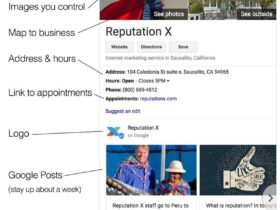You already know that the strongest personal leadership brand is one that reflects your absolute best. It perfectly captures everything that makes you uniquely you. It brings together your individual strengths and presents them in a way that benefits both you and your organisation. That being said, a strong personal leadership brand is also an authentic one.
What a well-executed personal leadership brand can do for you
Building your personal leadership brand can benefit you in so many ways when it’s done well. For example, it can increase your influence because you’ve built up a high level of credibility. While many professionals may have an academic or work background similar to yours, they don’t necessarily share your distinct area of expertise or have the exact same approach to business.
Believe it or not, it can also minimise imposter syndrome. Because building a personal leadership brand requires quite a bit of self-reflection – you need to identify your strengths and unique qualities – the entire process can help give you clarity about who you are and what you are capable of.
More importantly, though, building your personal leadership brand can help you chart your career on your own terms. Whether you’re actively working on it or not, you already have a brand. The difference is that, by actively building it, you get to be the author of your own story and steer the narrative instead of letting others pen it for you.
How do I know I’m doing personal leadership branding wrong?
Every action you take as a leader, in building your brand, either strengthens or weakens it. When there’s a specific leadership role you’re aiming for, there’s no room for the same mistakes others make. It could very well cast a shadow over everything you say or do as a leader.
While it’s okay to be human and make mistakes, you still need to be strategic. If your branding strategy is weak, you’ve already lost the battle before it even begins.
Here are four signs that your approach to personal leadership branding is off track:
#1 You don’t know exactly why you want to build one
You’re building a brand to accomplish certain goals. What are those goals? What do you want to do with your brand once you’ve built it? Many professionals don’t have a long-term vision and mission, which is why they end up not seeing a difference in how their audience perceives them.
If the bigger picture isn’t clear, and you haven’t defined the values you want to embody as a leader or set specific goals, you’re not building a bridge to future opportunities.
#2 You equate your brand with your CV
As we make our way up in the business world, it’s only natural to want to share all our achievements and qualifications. While there’s no shame in that, especially when you’ve poured your heart and soul into your work, we forget that not everyone will resonate with our journey. In today’s day and age, simply listing everything that can be found on your CV isn’t going to attract the right people.
A strong personal leadership brand is a relatable brand. Remember, your target audience may not have reached the milestones you have, and if that’s the focus, many might lose interest in what you have to say simply because they can’t relate. They’ll hit the unfollow button and seek out someone they actually feel a connection with.
#3 You are being too vanilla
If you’re playing it safe and not allowing yourself to be a little vulnerable at times, you’ll end up sounding like everyone else. Focusing too much on what you think people want also means you end up losing who you actually are. And trust me, you’re doing no one a favour by being a watered-down version of yourself.
#4 You are marketing yourself before your brand is built
Too many professionals think building a personal leadership brand is quick and easy and treat it as something they can just check off on their to-do list, when in reality, it requires ongoing maintenance. If you’re going to market yourself without laying the groundwork, you’re setting yourself up for a cycle of constant rebranding, which ultimately portrays you as inconsistent and inauthentic.
Building a personal leadership brand does take time and hard work to get 100% right, but the investment is worthwhile if you want to cultivate a brand that draws in the right people and opportunities.
How to brand yourself smarter
When you start out in a new leadership role or at a new job, you obviously want to make a good impression and show what makes you valuable, but there’s also pressure to fit into the existing culture. This means that you’re most likely not showing up as your true self, and the thing is, people will see right through that. They always do.
What makes a person magnetic and what exactly is it about them that inspires others to follow their lead? Usually, it’s not the tallest or buffest guy in the room, nor is it the one who wears the most expensive watch or the sleekest suit. It’s the person who is comfortable in their own skin and creates space for others to do the same. There’s something extremely attractive and appealing about that.
More often than not, this is the person who has done the inner work. And it most likely didn’t happen overnight. They’ve truly sat with their own thoughts, taken the time to figure out the type of person and leader they want to become, and had a plan to make it happen. The great thing about this is that absolutely anyone can do it.
You may not have been blessed with perfect cheekbones, a flawless hairline, or other physical gifts, but you can learn to be authentic. You just need to peel back the layers and get comfortable being YOU and convince yourself that you belong in the room.
I love what Emmy award-winning director and designer Chris Do once said: “Building a brand is not a product of invention, it is a product of memory.” Although admittedly a bit corny, I think this ties in perfectly with Charles Bukowski’s famous quote, “Can you remember who you were, before the world told you who you should be?”
When you think about it, the time between around three and nine years old is when we are our true self. But then, life happens, and through societal conditioning and schooling, we’ve lost that. In many ways, our society punishes people who stand out. If you are an anomaly, you are, for example, going to be put in a different class. All of a sudden, your social structure is going to collapse because your teachers and your peers are now going to look at you differently and treat you differently. So, what do we do? We learn to conform and follow the crowd.
With personal leadership branding, you get the opportunity to rediscover your true self. It allows you to revisit and showcase the real you to the world – because ultimately – it’s the real you that’s going to get you somewhere in life.
Final thoughts
You may feel you have it in you to be a great leader, but is it evident to those around you? If you are in it for the long run, you need to see your personal leadership brand as an invaluable investment that will outlive you.
While the projects you become involved in and the accomplishments you attain may be transient, your personal leadership brand will live on and add value to everything you bring to the table. You need to make it easy for people to want to follow you by developing your brand the right way.















